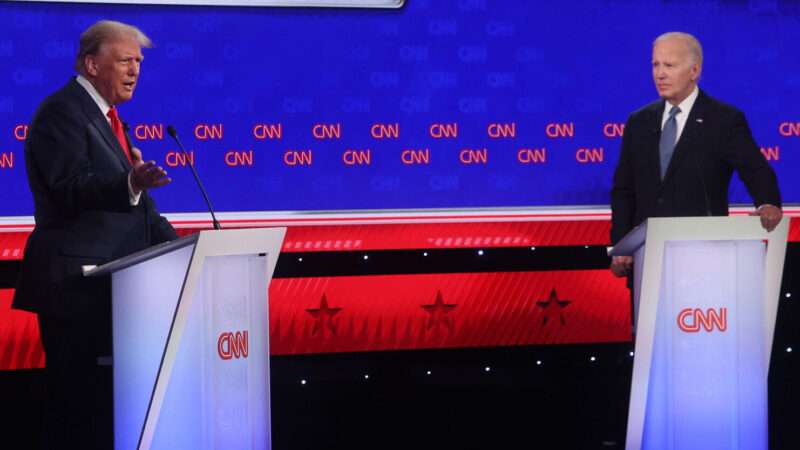
In a letter to House Democrats urging their support for his re-election, President Joe Biden slammed Donald Trump's recent call for a 10-percent across-the-board tariff on imported products, complaining that it will boost household costs on the average American by $2,500 a year.
He's onto something. Tariffs, which are levies imposed on foreign products generally as a means to prop up domestic manufacturers, are just a fancy term for tax hikes. They limit consumer choices as other countries stop shipping goods to our markets. They boost inflation. For instance, Trump's steel tariffs protected the U.S. steel industry, but raised the price on every item that relies upon steel.
They lead to trade wars, as other countries retaliate by placing tariffs on U.S. products. By limiting competition, tariffs reduce innovation. Competition is the key to building better mousetraps, but why innovate and cut costs when the government protects your industry from market forces? Unlike with, say, sales taxes, consumers never know why that Toyota suddenly costs an extra thousand bucks.
The letter understands that Trump's proposed tariffs will erode Americans' buying power, but here's a report from The Wall Street Journal two days later about Biden's latest policy: "The U.S. will levy a 25 percent tariff on Mexican imports containing steel from China and a 10 percent duty on products made with aluminum from the country." How can anyone take his letter seriously?
The media have focused intently on Biden's fitness for office after a debate performance that focused attention on his age. Reporters love horse race stories. Will he stay or will he go? It's a legitimate topic, as are stories about Trump's rallies with his characteristic free associations and rabble-rousing. But there's been insufficient news coverage of both candidates' economic policies.
The problem is their trade policies are roughly the same. Sure, they embrace high tariffs for different reasons. Democrats want to protect domestic unions. Republicans of the populist and national-conservative variety are mostly worried about threats from China. They all sound more radical these days than Bernie Sanders.
"We must put American workers first, bring jobs back to American soil, and reject radical climate mandates that make China rich and America poor," said U.S. Sen. Josh Hawley (R–Mo.), known for giving January 6 protesters a fist pump, while introducing a bill to slap tariffs on Chinese electric vehicles. At a recent National Conservatism conference, Hawley attacked the free market in a way not much different than leftists.
As I regularly note, we're seeing the horseshoe theory of politics, as right and left find themselves in roughly the same place (like ends of a horseshoe) rather than far apart along a line. As a Politico in May explained, Trump's plans for tariffs in 2018 were met with "widespread derision," but now are broadly embraced by both parties.
"The contrasting reactions to similar policy moves just a few years apart is yet another reminder of just how much the U.S. political consensus has shifted against free trade," according to the article. There are many reasons for our current bout of inflation, but I've yet to see intense news coverage of the likely link between tariffs and rising prices.
It's time to revisit the basics. The Heritage Foundation, the group now closely associated with Trumpism, argued in 2021 that tariffs helped push aluminum prices up 50 percent. It defanged one of the main progressive/national-conservative arguments in favor of them—that they're needed to prevent countries from "dumping" low-priced goods in the United States.
"In fact, the idea of dumping is one of the great unicorns of trade policy: oft-imagined but rarely seen in reality," Heritage researchers concluded. "Even state-supported Chinese firms cannot sustain such losses, bleeding money with each shipment of aluminum sent across the ocean." Indeed. But tariff advocates need scare stories to pump up their high-tax policies, as they put rent-seeking corporations and unions above American consumers.
I always love to quote Ronald Reagan, especially now that conservatives have largely abandoned his legacy: "Free trade serves the cause of economic progress, and it serves the cause of world peace. When governments get too involved in trade, economic costs increase and political disputes multiply." Of course, Reagan sometimes violated his own principles.
The year after that 1982 speech, he spearheaded 45-percent tariffs on imported heavy motorcycles—a blatant attempt to protect Harley Davidson from Japanese competition. The Japanese mainly adjusted their model lineups and Harley doubled down on its niche market and has been in perpetual decline. Many observers trace the company's current struggles to those tariffs.
I'm for free trade because it promotes freedom, reduces government control, promotes innovation, reduces prices, relieves international tensions, lessens overseas poverty, reduces pressure for immigration, and boosts worldwide living conditions. Sadly, whichever of these candidates wins the 2024 election, we're stuck with a new round of terrible trade policies.
The post Biden and Trump Are Pushing the Same Failed Trade Policies appeared first on Reason.com.







